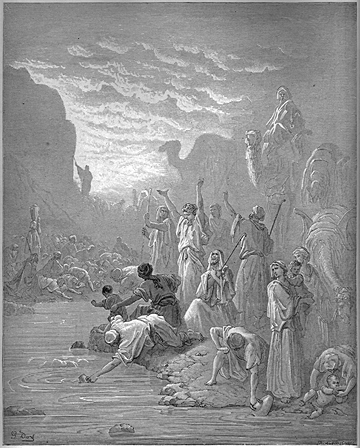Thaama 17
1 Mũingĩ wothe wa Isiraeli ũkiumagara kuuma Werũ wa Sini, ũkoimaga handũ hamwe ũgathiĩ harĩa hangĩ o ta ũrĩa Jehova aathanaga. Makĩamba hema ciao Refidimu, no gũtiarĩ maaĩ ma kũnyuuo nĩ andũ acio.
Obeying what Yahweh commanded, all the Israeli people moved from the Sin Desert. They/We traveled from one place to another. They/We camped at [a place named] Rephidim, but there was no water there for (the people/us) to drink.
2 Nĩ ũndũ ũcio andũ acio makĩnegenia Musa, makĩmwĩra atĩrĩ, “Tũhe maaĩ ma kũnyua.” Nake Musa akĩmacookeria atĩrĩ, “Mũranegenia nĩkĩ? Nĩ kĩĩ gĩgũtũma mũgerie Jehova?”
So the people complained to Moses/me again, saying, “Give us water to drink!” Moses/I replied to them, “Why are you (criticizing/arguing with) me [RHQ]? And why are you trying to determine whether Yahweh [has the power to provide for you]?”
3 No andũ nĩmanyootire marĩ kũu, nao magĩtetia Musa makĩmũũria atĩrĩ, “Watũrutire bũrũri wa Misiri nĩkĩ, tũũke ũtũũrage na nyoota ithuĩ na ciana ciitũ na ũhiũ witũ?”
But the people were very thirsty, and they continued to complain to Moses/me. They were saying things like “Why did you bring us out of Egypt?”, and “Did you bring us here to cause us and our children and livestock to die (from thirst/because we had no water to drink) [RHQ]?”
4 Nake Musa agĩkaĩra Jehova akĩmũũria atĩrĩ, “Ngwĩka atĩa na andũ aya? Marĩ hakuhĩ kũhũũra na mahiga nyuguto.”
So Moses/I prayed earnestly to Yahweh. He/I said, “(How shall I deal with these people?/I do not know how to deal with these people!) [RHQ] They are almost ready to [kill me by throwing] stones at me!”
5 Jehova agĩcookeria Musa, akĩmwĩra atĩrĩ, “Thiĩ mbere ya andũ aya. Thiĩi na athuuri amwe a Isiraeli na ũkuue rũthanju rũrĩa wagũthire Nili naruo.
Yahweh replied to Moses/me, “Take some of the elders/leaders of the Israeli people with you and [tell the rest of] the people to follow you [to Sinai Mountain]. Take along the stick with which you struck the Nile [River].
6 Niĩ ngũrũgama hau mbere yaku, o hau hakuhĩ na rwaro rwa ihiga kũu Horebu. Gũtha ihiga, na maaĩ nĩmekuuma thĩinĩ warĩo nĩguo andũ manyue.” Nĩ ũndũ ũcio Musa agĩĩka ũguo athuuri a Isiraeli makĩonaga.
Listen carefully: I will stand in front of you on top of a [large] rock at the foot of the mountain. Strike the rock with your stick. [When you do that], water for the people to drink will flow out of the rock.” [When they/we arrived at the mountain], Moses/I did that while the Israeli elders were watching, [and water flowed from the rock].
7 Nake agĩĩta handũ hau Masa na Meriba, tondũ nĩho andũ a Isiraeli maanegenirie na makĩgeria Jehova, makĩũragia atĩrĩ, “Ĩĩ Jehova arĩ hamwe na ithuĩ kana aca?”
Moses/I gave that place two names [in the Hebrew language: ] Massah, [which means ‘testing’], and Meribah, [which means ‘complaining’]. He/I gave it the name Massah because the Israeli people were testing Yahweh, saying “Is Yahweh really among us [and able to help us], or not?”, and he/I gave it the name Meribah because they were [continually] complaining.
8 Andũ a Amaleki nĩmookire makĩhithũkĩra andũ a Isiraeli kũu Refidimu.
Then the descendants of the Amalek people-group came and fought against the Israeli people at Rephidim.
9 Musa akĩĩra Joshua atĩrĩ, “Thuura andũ amwe aitũ mumagare mũkahũũrane na andũ a Amaleki. Rũciũ ngaarũgama kĩrĩma igũrũ nyiitĩte rũthanju rwa Ngai na guoko.”
Moses/I said to Joshua, [who was one of our army/Israeli leaders], “Choose some men to go out and fight against the Amalek people-group tomorrow. I will stand on the top of the hill, holding the stick that God told me to carry.”
10 Nĩ ũndũ ũcio Joshua akĩhũũrana na andũ a Amaleki o ta ũrĩa Musa aathanĩte; nake Musa, na Harũni na Huri makĩhaica kĩrĩma-inĩ.
So Joshua did what Moses/I told him to do. He took some men to fight against the Amalek people-group. [While they were fighting], Aaron, Hur, and Moses/I went up to the top of the hill [so that they/we could see the whole battle area].
11 Rĩrĩa rĩothe Musa akoragwo oete moko make na igũrũ-rĩ, andũ a Isiraeli makahootana, no rĩrĩa agũithia moko make, andũ a Amaleki makahootana.
Whenever Moses/I lifted up his/my arms, the Israeli men started to win [the battle]. And whenever he/I lowered his/my arms, the Amalek people-group started to win.
12 Rĩrĩa Musa aanogire moko-rĩ, makĩoya ihiga makĩiga thĩ akĩrĩikarĩra. Harũni na Huri magĩkĩnyiitĩrĩra moko make, o ũmwe akanyiitĩrĩra guoko kũmwe, na ũcio ũngĩ kũu kũngĩ. Nĩ ũndũ ũcio moko ma Musa magĩikara mambarairio nginya riũa rĩgĩthũa.
But his/my arms became tired. So Aaron and Hur [rolled] a [large] stone for Moses/me to sit on. [While he/I was sitting on it], those two held up his/my arms, [one on one side and the other on the other side]. In that way, they kept his/my arms lifted up, and his/my arms held steady until the sun went down.
13 Nĩ ũndũ ũcio Joshua akĩhoota mbũtũ cia andũ a Amaleki na rũhiũ rwa njora.
So Joshua and the men with him completely defeated the Amalek people-group, using their swords [to fight against them].
14 Ningĩ Jehova akĩĩra Musa atĩrĩ, “Andĩka ũndũ ũyũ ibuku-inĩ rĩa gĩkũnjo ũrĩ ũndũ wa gũtũũra ũririkanagwo na ũreke Joshua aũigue, tondũ nĩngeheria rĩĩtwa rĩa Amaleki biũ nao matigacooka kũririkanwo gũkũ thĩ.”
Then Yahweh said to Moses/me, “Write an account of this battle, and then read it to Joshua. [Also write that some day] I will completely get rid of the Amalek people-group.”
15 Musa agĩaka kĩgongona na agĩgĩĩta atĩrĩ “Jehova Nĩwe Bendera yakwa.”
Then Moses/I built a [stone] altar there and named it ‘Yahweh is [like] my flag’.
16 Akiuga atĩrĩ, “Nĩgũkorwo moko nĩmambararirio na igũrũ kwerekera gĩtĩ-inĩ kĩa ũnene kĩa Jehova. Jehova arĩhũũranaga na andũ a Amaleki kuuma njiarwa na njiarwa.”
He/I said, “Hold high Yahweh’s flag! Yahweh will continue to fight against the Amalek people-group (forever/in all future generations)!”





















